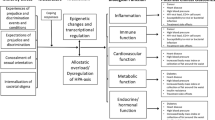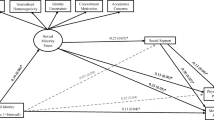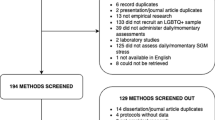Abstract
Sexual minorities experience higher rates of several physical health problems compared to their heterosexual counterparts. The present study uses Meyer's Minority Stress Model (Psychological Bulletin, 129(5): 674-697, 2003) to examine physical health indicators among 250 adults who identified as sexual minorities. Study hypotheses include that sexual minority stress is predictive of two physical health indicators (i.e., engagement in a health-promoting lifestyle and number of physical health problems) and that planning (i.e., problem-focused) and social support coping will partially mediate the relationship between sexual minority stress and each physical health indicator. Results showed that as level of sexual minority stress increased, engagement in a health-promoting lifestyle decreased and the number of physical health problems increased. Planning and social support coping did not mediate these relationships; however, as levels of coping increased, engagement in a health-promoting lifestyle increased. These findings have implications for researchers and healthcare professionals in their efforts to promote the physical health of sexual minorities.


Similar content being viewed by others
Change history
22 December 2017
The original version of this article unfortunately contains a mistake. In page 229, first paragraph, line 5, the value 0.353 should read as 0.347. In page 230, first paragraph, line 10, the value 0.121 should read as − 0.121.
References
Arbuckle, J. L. (2008). Amos 17.0 User’s guide. Crawfordville, FL: Amos Development Corporation.
Bayliss, M., Rendas-Baum, R., White, M. K., Maruish, M., Bjorner, J., & Tunis, S. L. (2012). Health-related quality of life (HRQL) for individuals with self-reported chronic physical and/or mental health conditions: Panel survey of an adult sample in the United States. Health and Quality of Life Outcomes, 10, 154. doi:10.1186/1477-7525-10-154.
Bhandari, A., & Wagner, T. (2006). Self-reported utilization of health care services: Improving measurement and accuracy. Medical Care Research & Review, 63(2), 217–235. doi:10.1177/1077558705285298.
Blosnich, J. R., Farmer, G. W., Lee, J. G. L., Silenzio, V. M. B., & Bowen, D. J. (2014). Health inequalities among sexual minority adults: Evidence from ten U.S. states, 2010. American Journal of Preventive Medicine, 46(4), 337–349. doi:10.1016/j.amepre.2013.11.010.
Boehmer, U., Bowen, D. J., & Bauer, G. R. (2007). Overweight and obesity in sexual-minority women: Evidence from population-based data. American Journal of Public Health, 97(6), 1134–1140. doi:10.2105/AJPH.2006.088419.
Carver, C., Scheier, M., & Weintraub, J. (1989). Assessing coping strategies: A theoretically based approach. Journal of Personality and Social Psychology, 56(2), 267–283. doi:10.1037/0022-3514.56.2.267.
Centers for Disease Control and Prevention. (2015). Diagnoses of HIV infection in the United States and dependent areas, 2013. HIV Surveillance Report, 25. Retrieved from http://www.cdc.gov/hiv/pdf/library/reports/surveillance/cdc-hiv-surveillance-report-vol-25.pdf on 5 June 2016.
Chao, R. C. (2011). Managing stress and maintain well-being: Social support, problem-focused coping, and avoidant coping. Journal of Counseling & Development, 89(3), 338–348. doi:10.1002/j.1556-6678.2011.tb00098.x.
Conron, K. J., Mimiaga, M. J., & Landers, S. J. (2010). A population-based study of sexual orientation identity and gender differences in adult health. American Journal of Public Health, 100(10), 1953–1960. doi:10.2105/AJPH.2009.174169.
Danaei, G., Ding, E. L., Mozaffarian, D., Taylor, B., Rehm, J., Murray, C.J. L. et al. (2009). The preventable causes of death in the United States: Comparative risk assessment of dietary, lifestyle, and metabolic risk factors. PLoS Medicine, 6(4), e1000058. doi:10.1371/journal.pmed.1000058.
DiMatteo, M. R. (2004). Variations in patients’ adherence to medical recommendations: A quantitative review of 50 years of research. Medical Care, 42(3), 200–209. doi:10.1097/01.mlr.0000114908.90348.f9.
Doty, N. D., Willoughby, B. L. B., Lindahl, K. M., & Malik, N. M. (2010). Sexuality related social support among lesbian, gay, and bisexual youth. Journal of Youth Adolescence, 39, 1134–1147. doi:10.1007/s10964-010-9566-x.
Duangdao, K. M., & Roesch, S. C. (2008). Coping with diabetes in adulthood: A meta-analysis. Journal of Behavioral Medicine, 31(4), 291–300. doi:10.1007/s10865-008-9155-6.
Farmer, G. W., Jabson, J. M., Bucholz, K. K., & Bowen, D. J. (2013). A population-based study of cardiovascular disease risk in sexual-minority women. American Journal of Public Health, 103(10), 1845–1850. doi:10.2105/AJPH.2013.301258.
Frisell, T., Lichtenstein, P., Rahman, Q., & Langstrom, N. (2010). Psychiatric morbidity associated with same-sex sexual behaviour: Influence of minority stress and familial factors. Psychological Medicine, 40(2), 315–324. doi:10.1017/S0033291709005996.
Frost, D. M., Lehavot, K., & Meyer, I. H. (2015). Minority stress and physical health among sexual minority individuals. Journal of Behavioral Medicine, 38(1), 1–8. doi:10.1007/s10865-013-9523-8.
Hequembourg, A. L., & Brallier, S. A. (2009). An exploration of sexual minority stress across the lines of gender and sexual identity. Journal of Homosexuality, 56(3), 273–298. doi:10.1080/00918360902728517.
Herek, G. M., & Garnets, L. D. (2007). Sexual orientation and mental health. Annual Review of Clinical Psychology, 3, 353–375. doi:10.1146/annurev.clinpsy.3.022806.091510.
Institute of Medicine. (2011). The health of lesbian, gay, bisexual, and transgender people: Building a foundation for better understanding. Washington: The National Academies Press.
Karlsen, E., Dybdahl, R., & Vitterso, J. (2006). The possible benefits of difficulty: How stress can increase and decrease subjective well-being. Scandinavian Journal of Psychology, 47(5), 411–417. doi:10.1111/j.1467-9450.2006.00549.x.
Lazarus, R. S., & Folkman, S. (1984). Stress, appraisal, and coping. New York: Springer.
Lehavot, K., & Simoni, J. M. (2011). The impact of minority stress on mental health and substance use among sexual minority women. Journal of Consulting & Clinical Psychology, 79(2), 159–170. doi:10.1037/a0022839.
Lewis, R. J., Derlega, V. J., Berndt, A., Morris, L. M., & Rose, S. (2002). An empirical analysis of stressors for gay men and lesbians. Journal of Homosexuality, 42(1), 63–68. doi:10.1300/J082v42n01_04.
Lewis, R. J., Milletich, R. J., Derlega, V. J., & Padilla, M. A. (2014). Sexual minority stressors and psychological aggression in lesbian women’s intimate relationships: The mediating roles of rumination and relationship satisfaction. Psychology of Women Quarterly, 38(4), 535–550. doi:10.1177/0361684313517866.
Lick, D. J., Durso, L. E., & Johnson, K. L. (2013). Minority stress and physical health among sexual minorities. Perspectives on Psychological Science, 8(5), 521–548. doi:10.1177/1745691613497965.
Livingston, N. A., Christianson, N., & Cochran, B. N. (2016). Minority stress, psychological distress, and alcohol misuse among sexual minority young adults: A resiliency-based conditional process analysis. Addictive Behaviors, 63, 125–131. doi:10.1016/j.addbeh.2016.07.011.
Mansini, B. E., & Barrett, H. A. (2008). Social support as a predictor of psychological and physical well-being and lifestyle in lesbian, gay, and bisexual adults aged 50 and over. Journal of Gay & Lesbian Social Services, 20(1–2), 91–110. doi:10.1080/10538720802179013.
McElligott, D., Capitulo, K. L., Morris, D. L., & Click, E. R. (2010). The effect of a holistic program on health-promoting behaviors in hospital registered nurses. Journal of Holistic Nursing, 28(3), 175–183. doi:10.1177/0898010110368860.
Meyer, I. H. (2003). Prejudice, social stress, and mental health in lesbian, gay, and bisexual populations: Conceptual issues and research evidence. Psychological Bulletin, 129(5), 674–697. doi:10.1037/0033-2909.129.5.674.
Meyer, I. H. (2007). Prejudice and discrimination as social stressors. In I. H. Meyer & M. E. Northridge (Eds.), The health of sexual minorities: Public health perspectives on lesbian, gay, bisexual, and transgender populations (pp. 242–267). New York: Springer.
Moskowitz, J. T., Hult, J. R., Bussolari, C., & Acree, M. (2009). What works in coping with HIV? A meta-analysis with implications for coping with serious illness. Psychological Bulletin, 135(1), 121. doi:10.1037/a0014210.
National Center for Chronic Disease Prevention and Health Promotion. (2015). Chronic disease overview. Retrieved from http://www.cdc.gov/chronicdisease/overview/ on 5 June 2016.
Office of Disease Prevention and Health Promotion. (2011). Lesbian, gay, bisexual, and transgender health. Retrieved from http://www.healthypeople.gov/2020/topicsobjectives2020/overview.aspx?topicid=25 on 5 June 2016.
Pascoe, E. A., & Smart Richman, L. (2009). Perceived discrimination and health: A meta-analytic review. Psychological Bulletin, 135(4), 531–554. doi:10.1037/a0016059.
Preacher, K. J., & Hayes, A. F. (2008). Asymptotic and resampling strategies for assessing and comparing indirect effects in multiple mediator models. Behavior Research Methods, 40(3), 879–891. doi:10.3758/BRM.40.3.879.
Shively, M. G., & DeCecco, J. P. (1977). Components of sexual identity. Journal of Homosexuality, 3(1), 41–48. doi:10.1300/J082v03n01_04.
Shrout, P. E., & Bolger, N. (2002). Mediation in experimental and nonexperimental studies: New procedures and recommendations. Psychological Methods, 7(4), 422–445. doi:10.1037//1082-989X.7.4.422.
Struble, C. B., Lindley, L. L., Montgomery, K., Hardin, J., & Burcin, M. (2011). Overweight and obesity in lesbian and bisexual college women. Journal of American College Health, 59(1), 51–56. doi:10.1080/07448481.2010.483703.
Szymanski, D. M. (2009). Examining potential moderators of the link between heterosexist events and gay and bisexual men’s psychological distress. Journal of Counseling Psychology, 56(1), 142–151. doi:10.1037/0022-0167.56.1.142.
Vucenik, I., & Stains, J. P. (2012). Obesity and cancer risk: Evidence, mechanisms, and recommendations. Annals of the New York Academy of Sciences, 1271, 37–43. doi:10.1111/j.1749-6632.2012.06750.x.
Walker, S. N., & Hill-Polerecky, D. M. (1996). Psychometric evaluation of the Health-Promoting Lifestyle Profile II. Unpublished manuscript, University of Nebraska Medical Center.
Walker, S. N., Sechrist, K. R., & Pender, N. J. (1987). The health-promoting lifestyle profile: Development and psychometric characteristics. Nursing Research, 36(2), 76–81. doi:10.1097/00006199-198703000-00002.
World Health Organization. (2009). Global health risks: Mortality and burden of disease attributable to selected major risks. Geneva: World Health Organization
Acknowledgements
We thank the Health Psychology Research Team at the University of Florida for their assistance with this research.
Author information
Authors and Affiliations
Corresponding author
Ethics declarations
Conflict of Interest
Delphia J. Flenar, Carolyn M. Tucker, and Jaime L. Williams declared that they have no potential conflicts of interest with respect to the research, authorship, and/or publication of this article.
Human and Animal Rights and Informed Consent
All procedures performed in this study involving human participants were done in accordance with the ethical standards of the University of Florida and with the 1964 Helsinki declaration and its later amendments or comparable ethical standards. Informed consent was obtained from all study participants.
Additional information
A correction to this article is available online at https://doi.org/10.1007/s10880-017-9523-x.
Rights and permissions
About this article
Cite this article
Flenar, D.J., Tucker, C.M. & Williams, J.L. Sexual Minority Stress, Coping, and Physical Health Indicators. J Clin Psychol Med Settings 24, 223–233 (2017). https://doi.org/10.1007/s10880-017-9504-0
Published:
Issue Date:
DOI: https://doi.org/10.1007/s10880-017-9504-0




